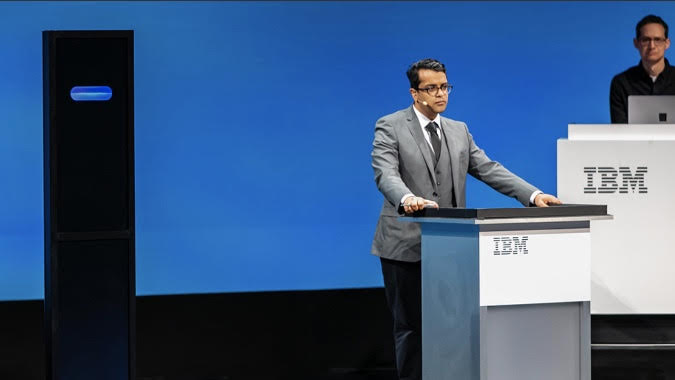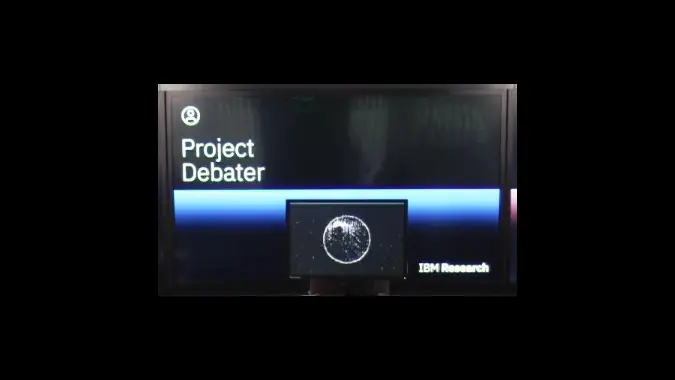Off Topic: AI aren’t good enough to win arguments (yet), but they’re already smart enough to be a little scary

Several years ago, the world watched IBM’s Watson AI defeat the best Jeopardy players in the world. Now scientists had this super smart AI, what would they do with it? They taught it how to argue, of course.
Not the normal arguments you see on the web full of ad hominem, red herrings, and strawman attacks: this AI would debate in the formal academic structure. The result became Project Debater. A few days ago, IBM repeated their Jeopardy experience and had Project Debater take on world champion debater Harish Natarajan. But unlike the Jeopardy match, this time, the human won. Break out the champagne, because humans are still better at arguing than the machines we’ve created to argue with us.
While Natarajan did win the key metric of percentage of the audience swayed to his position, the same audience indicated they learned more from Project Debater answers — so a fairer assessment of the outcome may be to call this match a split decision.
And that’s amazing.
The future is (almost) here
To concentrate only on the outcome in this contest does a disservice to the engineers and researchers who created Project Debater. Think about what this program had to do. It read thousands of articles in seconds. That’s easy for a computer, but hard for a human — but computers don’t have every advantage. The AI had to make all the connections between the concepts in those articles. It had to take millions of words and find the one to two thousand it needed to build its argument. Making connections like that is easy for a human, but hard for a computer. We do this so naturally, and don’t even conceptualize how hard it is to codify in a way a computer can process. I’m a professional software developer and the enormity of the task blows my mind.
Our society is at the Sopwith Camel level of AI. If you’re not familiar, the Sopwith Camel was the iconic World War 1 biplane most famous its dogfights against the Red Baron. It represented a major leap forward in early aviation technology, but it pales in comparison to even the sleek Japanese Zero of World War 2 and seems downright archaic compared to a 1990s F14 Tomcat or a modern F-35 Lightning. The AIs of today, as amazing as they are, will look primitive in a few years.

AI is no longer science fiction
AI is going to change our world in big ways. Most people expect AI to adapt to drive cars and big rigs, and eventually perform warehouse freight moving jobs. It already has applications in customer service. On my last trip, when I called to put a travel advisory on my credit cards to use them out of state, I did the entire transaction talking to an AI.
AI is helping doctors read mammograms better and detect melanomas, where AI-based analysis does as well as physician interpretation. It’s also helping pathologists detect when cancer has spread to Lymph nodes, sometimes with even greater accuracy than the humans. Not to only pick on doctors, an AI learned to analyze NDAs for risks. In a study, an AI did as well as a lawyer and completed its analysis in seconds — hundreds of times faster than the fastest human. Already, researchers have developed an AI which could have written this article. This writing AI is so capable that researchers aren’t releasing their full data to the public.
All this news is a mixture of exciting and maybe a little scary. I mean, do none of these researchers watch or read science fiction? Has The Matrix or The Terminator predicted the future? But no — sci-fi doesn’t predict the future. Instead, it casts a vision of a possible future, sometimes hopeful and bright, sometimes dark and scary. It falls to the scientists, inventors and creators to bring the vision to life. Star Trek: The Original Series is often cited as the genesis of the idea of the flip phone, and Star Trek: The Next Generation for the iPad. Nike is even making a version of the automatic lace up shoes from Back to the Future. (Spoiler: they worked better in the movie.)
AI is going to change the world. IBM Debater, at its core, is fantastic at weighing pros and cons, which is the essence of decision making. Humans, working with AI tools, will determine what the future looks like.
Please consider supporting our Patreon!
Join the Discussion
Blizzard Watch is a safe space for all readers. By leaving comments on this site you agree to follow our commenting and community guidelines.
 @honorshammer
@honorshammer




